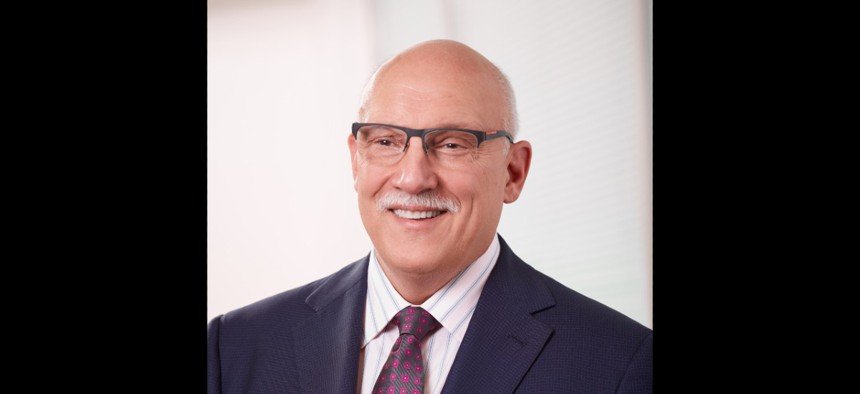Top 100 Q&A: Stu Shea and the future of Peraton

Peraton CEO Stu Shea talks strategy and his company's position in the market. Courtesy of Peraton
This edited transcript contains part of our interview with Peraton's CEO at our Top 100 Big Breakdown event, where he described how the company has changed and what will determine its future.
As a veteran of the government market, Stu Shea has been an architect of more than his fair share of big deals.
In 2013, Shea helped oversee the split of the original Science Applications International Corp. into what is now SAIC and Leidos.
Now as CEO of Peraton, Shea led the closure of two blockbuster acquisitions within a few weeks of each other: the Northrop Grumman IT business and Peraton. Those deals took Peraton from around $1 billion in annual revenue to $7 billion almost overnight.
Shea sat for an on-stage Q&A as part of our Top 100 Big Breakdown event on June 6. Peraton ranks No. 9 on the 2023 rankings with $4.4 billion in prime contract obligations.
What follows is an edited transcript of the highlights from his conversation with Editor Nick Wakeman.
The entire video recording of the interview is available for WT Insider Members at this link.
WASHINGTON TECHNOLOGY: Let’s start with the big split and these big acquisitions. How were they different and were they alike in any way?
SHEA: At SAIC, we had hit this end of our natural life. We had so many disparate businesses. We had just gone public. But we could not get the value proposition out of the company. We needed to split. My argument was that we could create something that was truly unique.
Peraton (a spin out of unwanted IT parts of Harris Corp.) was an island of misfits, but I was excited. I had just taken a perfectly well-run company and ripped it apart. How cool would it be to do just the opposite and take a company that was not a company and create something differentiated in the market.
WT: What was the original strategy with Peraton?
SHEA: The original strategy hasn’t changed. We want to focus on things that matter and that are hard to do. We are focused on missions of consequence and those missions are always funded. They are things that are going to persist. Things like cyber, health, national security.
We were a $900 million company, so this journey was going to be about three years. We were owned by Veritas Capital and the fund was for five years. So I figured in three years, we’ll put lipstick on the pig, fix the business up and sell it and move on.
So, we built a team that could get there fast. Then the Friday before Thanksgiving 2020, Veritas called about Northrop Grumman and then a few weeks later with Perspecta.
WT: Private equity always gets to an exit. Do you have a vision for what that exit will be?
SHEA: It all depends. It depends on where Veritas is with their investment philosophy. I can influence that by continuing to grow the business. All businesses are about growth and a return of capital to the investor -- whether that’s a shareholder, private owner or private equity.
We thought the exit was going to be after three years. Today it’s a whole different story. We have now created a true industry competitor. We compete head-to-head with everybody.
Peraton may persist forever if we go public. Private equity will get out of the deal at some point. But who is going to buy a company of our scale, with our profitability and our success? That would be a nice multiple.
At some point, Veritas will want to get their money out, so when you look at the future of the company we’re a tweener. We aren’t a big publicly traded company and we aren’t a small company that could be acquired easily.
We are really this unicorn because we’re not like anyone else. That’s special and it has long-term implications in the market.
WT Insider members that want to watch the entire interview can click here.


